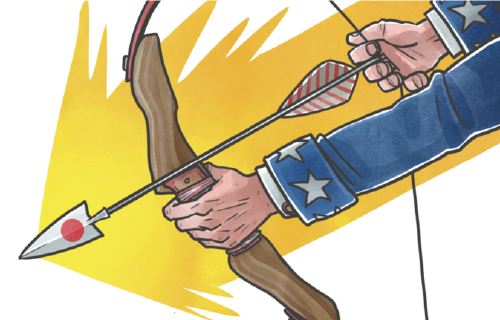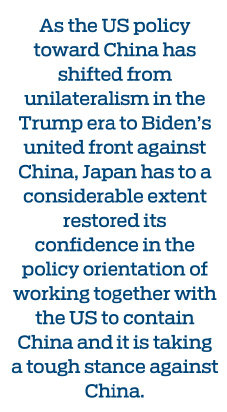Westward pivot
The fear of 'being abandoned' has prompted Japan to stabilize its alliance with the US
Editor's note: The world has undergone many changes and shocks in recent years. Enhanced dialogue between scholars from China and overseas is needed to build mutual understanding on many problems the world faces. For this purpose, the China Watch Institute of China Daily and the National Institute for Global Strategy, Chinese Academy of Social Sciences, jointly present this special column: The Global Strategy Dialogue, in which experts from China and abroad will offer insightful views, analysis and fresh perspectives on long-term strategic issues of global importance.
Since the normalization of diplomatic relations between China and Japan, their bilateral relationship has been under the influence and interference from the alliance between the United States and Japan. Even though Japan is seeking greater strategic autonomy, and the connection and interaction between China, Japan and the US is increasing, the intervention from the Japan-US alliance and its role in regulating China-Japan relations have not disappeared or been weakened. The primary goal of Japan's foreign strategy is to stabilize its alliance with the US. Under this premise, Japan has adjusted its alliance with the US to respond to the "China issue". It can be said that how Japan views its alliance with the US and the outcomes from its management of this alliance affect its relations with China to a large extent.
In the management of its alliance with the US, Japan, like many of the US' "secondary allies", has been struggling to deal with the dilemma of "getting involved "or "being abandoned". On the one hand, over-reliance on the alliance means it risks getting involved or trapped in the wars waged by the US. On the other hand, in seeking greater autonomy it risks being abandoned as an ally by the US. As far as the Japan-US alliance and Sino-Japanese relations are concerned, Japan is increasingly worried about the risk of "being abandoned" rather than the risk of "getting involved".
China's development has picked up steam and attained achievements recognized by the world since 2010, and the strategic strength and competitive capabilities between China and the US have become increasingly balanced. This has led to a lingering sense of doubt and fear in Japan, which is in a weak position in the US-Japan alliance. For Japan, there is always a sense of uneasiness. Other US allies, such as the Republic of Korea, the Philippines and Thailand, have always attached great importance to avoiding the risk of "getting involved". However, the actions of Japan increasingly show that it is more focused on dealing with the plight of "being abandoned". This is in line with the theory that the fear of "being abandoned" enables allies in weaker positions to adopt various hedging strategies.
Since the normalization of diplomatic relations between China and Japan over 50 years ago, Japan has adjusted its relations with China several times, all of which have been related to the status of its alliance with the US, that is, the risk of "being abandoned".Its decision to normalize relations with China in 1972 was directly related to the "Nixon Shock". And Japan's reaching of a 10-point consensus with China on building a China-Japan relationship that can meet the requirements of the new era in 2019 was related to the shock from the Donald Trump administration, as the Japan-US alliance was subjected to the most severe test since the end of the Cold War due to the Trump administration. While strengthening the alliance, Japan has also boldly carried out some attempts based on strategic autonomy. What was most notable was, due to the serious doubts and worries of "being abandoned" during the Trump presidency, it adopted a hedging strategy by taking a closer stance toward China.
After Joe Biden became president of the US in January 2021, the US-Japan alliance focused more on China. Unlike the Trump administration, one of the focal points of the Biden administration's China strategy is to unite its allies, form a united front on China issues, and carry out all-round suppression against China. After this policy pivot from the Trump era, the policy response from the US alliances was more coordinated than before. This is a period when the allies have the least disagreements on China issues and when Japan has its weakest dilemma on the alliance over the past decade. Japan and the US have moved closer on some strategic issues, and have taken new and important steps in coordinating their actions. As the US policy toward China has shifted from unilateralism in the Trump era to Biden's united front against China, Japan has to a considerable extent restored its confidence in the policy orientation of working together with the US to contain China and it is taking a tough stance against China.
What is particularly concerning recently is that Japan is actively cooperating with the US in putting in place "containment" measures against China in areas of security, diplomacy and economy and used such moves as a bargaining chip to stabilize its alliance with the US. Japan is also plotting the use of issues concerning the East China Sea, the South China Sea and the Taiwan question to seek deeper involvement from the US and the Japan-US alliance. Japan is no longer concerned about being involved in the conflict between China and the US as it used to be. Instead, it is fanning the flames, cooperating closely with the US, and even willing to stand at the forefront of military confrontation. As a result, Japan's overall strategy is pivoting westward and closer to the US and other major allies and partners, and the triangular relations between China, the US and Japan are becoming even more unbalanced. The negative factors in Japan's China policy have become more prominent, and containing China has become the focus of Japan's China policy and even its overall diplomacy.
It can be said that Japan's level of vigilance toward China has surpassed that of any historical period since the normalization of bilateral diplomatic relations. The Fumio Kishida administration's China policy on issues such as human rights, diplomacy, military transformation, economic security, the Taiwan question and island disputes, is becoming more aggressive, which has further intensified bilateral conflicts and frictions, and exerted a great negative impact on bilateral relations. Japan has a clear tendency in its strategic pivot toward the US, and its negative moves on major and sensitive issues are frequent, and its tendency to adopt confrontational strategies toward China has increased significantly. This tough and reckless response is bringing about a historic paradigm shift in China-Japan relations and the way the two countries get along.
Under this pattern of relations, two situations and trends have attracted the attention of the world. First, in the strategic competition between China and the US and Japan's relations with China and the US, Japan is quickening its efforts to build up alliances to contain China. Its adjustment of relations with China, or leaving room for maneuver, are moves of tactical hedging instead of strategic adjustment. Such changes will not go beyond the framework of Japan-US alliance in the foreseeable future. Second, Japan has got out of its dilemma of "being abandoned" and is taking on new security roles and defense functions by strengthening and extending its alliances. These new strategic directions are quietly changing the nature and structure of the Japan-US alliance, which may lead to greater changes in China-Japan relations and even the geopolitical structure of East Asia.




The author is the deputy director and researcher of the Institute of Japanese Studies at the Chinese Academy of Social Sciences. The author contributed this article to China Watch, a think tank powered by China Daily.














